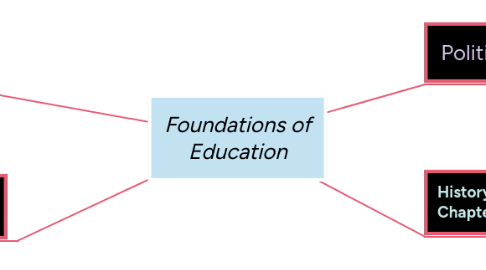
1. Politics of Education: Chapter 2
1.1. Intellectual
1.1.1. The intellectual purpose of schooling is to teach basic skills including reading, writing, and mathematics, and to install other specific knowledge such as history, literature, and sciences.
1.2. Political
1.2.1. The Political purposes of schooling are to prepare citizens who will participate in political order, to help assimilate diverse cultural groups into a common political order, and to teach children the basic laws of society.
1.3. Economic
1.3.1. Economic purposes of schooling include: Preparing students for their future economic roles, and to selection and training of individuals into the division of labor.
1.3.1.1. The degree to which schools prepare students directly for the workforce varies, however many schools do have a somewhat indirect role in this process.
1.4. Social
1.4.1. The social aspects of schooling are to help solve social problems; and to work as many institutions such as family and the church to ensure social cohesion.
2. History of U.S. Education: Chapter 3
2.1. Education for All: The Emergence of the Public High School
2.1.1. Between 1880 and 1920, 2,382,542 students (according to our text) attended public high schools and probably outnumbered those who attended academies. One monumental change that affected the attendance of high school students was a law that made it mandatory for students sixteen and under to attend some form of educational reform. Compulsory school laws grew at a steady pace and by 1890, 27 states had adopted them. Encouragement from several court cases brought all states to follow suit.
3. Sociological Perspectives: Chapter 4
3.1. Functionalism - concerned with the ways that societal and institutional forces create a collective conscience based on shared values.
3.2. Conflict Theory - the ability to dominate groups; to impose their will on subordinate groups through force, cooperation, and manipulation.
3.3. Internationalism - attempt to make the commonplace strange by turning on their heads every day taken-for-granted behaviors between students and students, and students and teachers.
4. Philosophy of Education: Chapter 5
4.1. Existentialists believe that individuals are placed on this earth alone and must make some sense of the chaos they encounter.
4.1.1. Sartre believed that people make their own selves and create their own meanings. In this belief, the amount of choice and potential a person has is practically limitless. Individuals are constantly in a state of becoming (picking and choosing) who they are in their own lifetime.
4.1.1.1. Existentialists believe that education should focus on the needs of the individual. They see education as an activity liberating the individual from a chaotic world.

